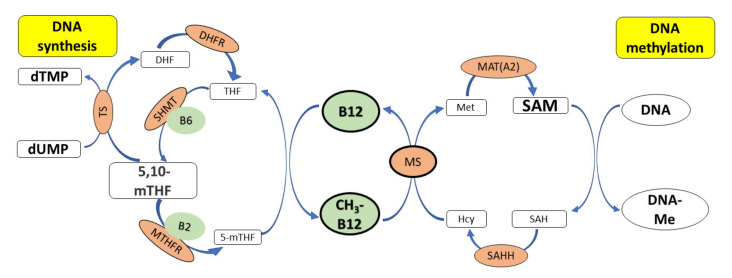Figure 4.
The role of vitamin B12 in synthesis and methylation of DNA. CH3-B12 serves as a cofactor for the methionine synthase (MS), which catalyzes the conversion of homocysteine (Hcy) to methionine (Met). Methionine is further converted to SAM (a donor of –CH3 groups during methylation of DNA) by methionine adenosyltransferase. 5,10-mTHF donates a methyl group during the synthesis of dTMP from dUMP, which is catalyzed by thymidylate synthase (TS). Deficiency of vitamin B12 leads to low levels of methionine and SAM and reduced methylation of DNA. SAM also inhibits MTHFR, thus preserving the cellular pool of 5,10-mTHF required for synthesis of dTMP. Deficiency of vitamin B12 results in low levels of SAM and high activity of methylenetetrahydrofolate reductase (MTHFR), which converts 5,10-mTHF to 5-mTHF, finally leading to an increase in the dUMP pool and uracil incorporation into DNA. Legend: 5,10-mTHF—N5,N10-methylenetetrahydrofolate, SAHH—S-adenosylhomocysteine hydrolase, Cys—cysteinę, DHF—dihydrofolate, DHFR—dihydrofolate reductase, dTMP—deoxythymidine monophosphate, dUMP—deoxyuridine monophosphate, Hcy—homocysteine, MAT(A2)—methionine adenosyltransferase, Met—methionine, MS—methionine synthase, MTHFR—methylenetetrahydrofolate reductase, MT—methyltransferase, SAH—S-adenosylhomocysteine, SAM—S-adenosylmethionine, SHMT—hydroxymethyltransferase, THF—tetrahydrofolate, TS—thymidylate synthase, B2—vitamin B2, B6—vitamin B6.

